Affinity and Wilhelmsen Ship Management form EU ETS compliance company: Wilhelmsen Ship Management (WSM) and shipbroker Affinity Shipping have signed a memorandum of understanding (MOU) to jointly establish an independent company that will provide comprehensive compliance services related to the EU ETS (European Union Emission Trading System). The service integrates technical ship management and carbon allowance procurement to support shipowners, managers, and operators in the new era of emissions compliance. Following the agreement in December among EU negotiators to include maritime shipping in the EU ETS, shipowners and operators will need to acquire emission permits for 40% of their applicable emissions in 2024, increasing to 70% in 2025, and 100% in 2026 and every year thereafter.
Tankers International launches fixture app CII feature: VLCC pool Tankers International has added a Carbon Intensity Indicator (CII) feature to its fixture app. The feature will use Tankers International’s data to calculate indicative CII scores for fixtures, benchmarking a vessel against its closest peer in the pool’s historical data. Indicative CII scores will take into consideration an adaptive benchmark speed drawn from average historical data and adjusted for market conditions that reflect the commercial influence on vessel speed.
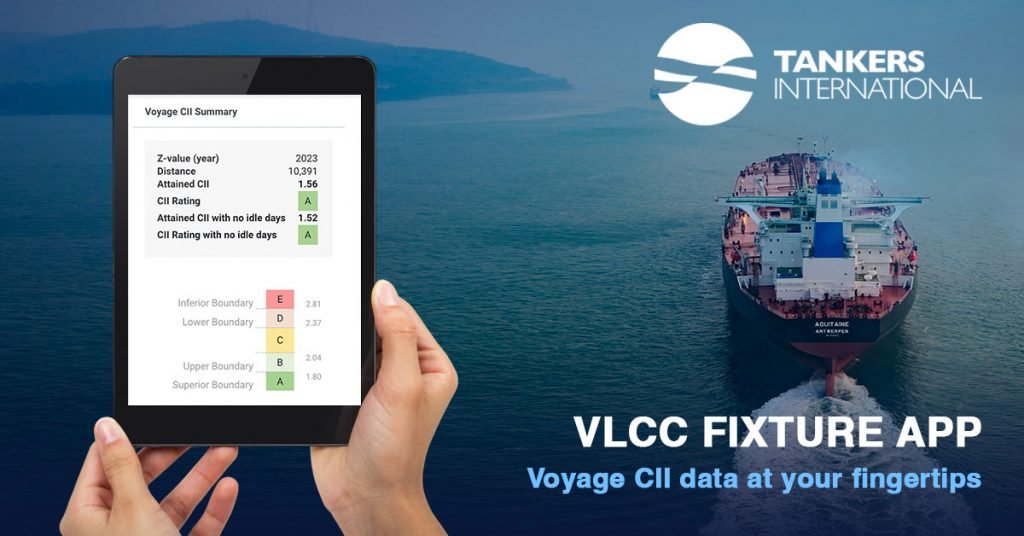 Greenabl Shippers Association: Logistics industry launches green supply chain coalition:
Greenabl Shippers Association: Logistics industry launches green supply chain coalition: The logistics industry is taking a major step towards sustainability with the launch of Greenabl Shippers Association, the first not-for-profit cooperative procurement group committed to decarbonizing the transportation sector. Managed by Bluspark, the association brings together expertise in ocean freight and procurement with support for importers and exporters, as demonstrated through its management of the Gemini Shippers Association. “Greenabl is the first of its kind and I’m optimistic that it will change the transportation industry for good,” said George Goldman, former president at ZIM American Integrated Shipping Services and executive chairman of Greenabl. “With a commitment to both inset and offset initiatives, plus the necessary reporting and analytics to measure success, Greenabl is providing a 360-degree solution.”
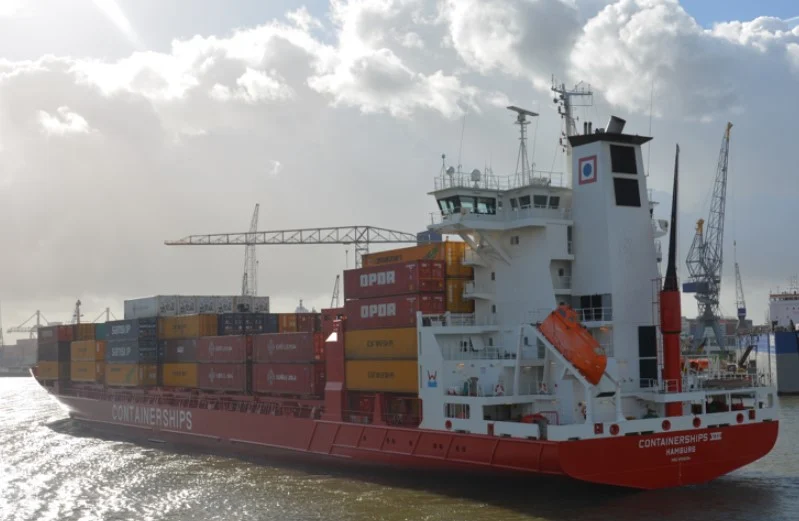
Chevron Shipping selects ABS wave sight’s my digital fleet to support greenhouse gas and Sea Cargo Charter Reporting: ABS Wavesight™, an ABS-affiliated company, has been selected to provide greenhouse gas (GHG) and Sea Cargo Charter reporting services to Chevron Shipping Company (CSC). ABS My Digital Fleet™ (MDF), ABS Wavesight’s flagship platform, will be used to improve CSC’s emissions reporting practices as it pursues lower carbon operations.
CSC plans to use ABS Wavesight to streamline and consolidate existing GHG data collection practices and systems by creating a single repository to use in meeting the International Maritime Organization, European Union, Sea Cargo Charter, and other reporting requirements. MDF’s ability to provide robust data collection, validation, and verification will also allow CSC to make more informed, data-based, technical, operational, and commercial decisions.
Next Generation of Vessels
BULKER
Vertom books two more methanol/hydrogen-ready electric bulkers: Dutch short sea shipping company Vertom Group has placed an order for two additional diesel-electric dry cargo vessels of LABRAX class from compatriot shipyard Thecla Bodewes Shipyards. As informed, two extra vessels will have the same specifications, including the optimised hull shape and diesel-electric propulsion system. The LABRAX vessels, with a 118-metre length, 14.30-metre beam and 6.20-metre draught, are developed to Vertom’s requirements. The completely box-shaped cargo holds will ensure maximum loading flexibility and cargo intake. Computational fluid dynamics (CFD) optimisation of the hull design has been performed for fuel-efficient speed-power performance, according to the company.
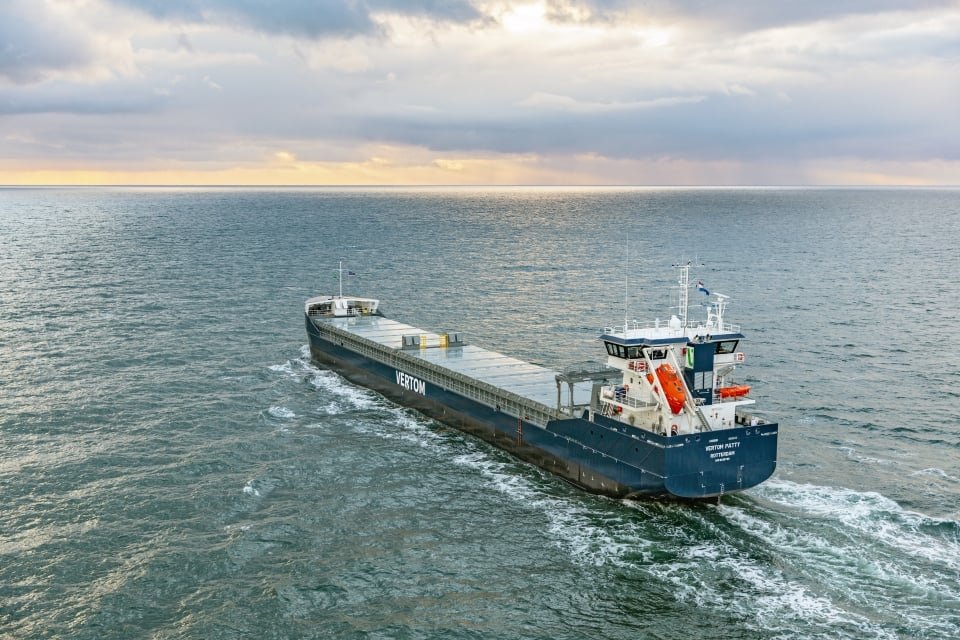
LNG BUNKER
Construction starts on Seaspan’s 1st LNG bunker vessel at CIMC SOE: Chinese shipbuilder CIMC Sinopacific Offshore & Engineering (CIMC SOE) has started construction of the first 7,600-cbm liquefied natural gas (LNG) bunkering vessel for Canadian shipowner Seaspan. The construction started on 2 February, at the Chinese yard. The ship will have a total length of 112.8 meters, a breadth of 18.6 meters, and a design draft of 5 meters. It will be able to travel at a speed of 13 knots and classed by the French classification society Bureau Veritas (BV). In addition, the ship is equipped with relevant propellers, which have excellent maneuverability, and can be applied to LNG loading, unloading, and bunkering services in different situations. The performance indicators of the ship have reached the international advanced level, according to the company.
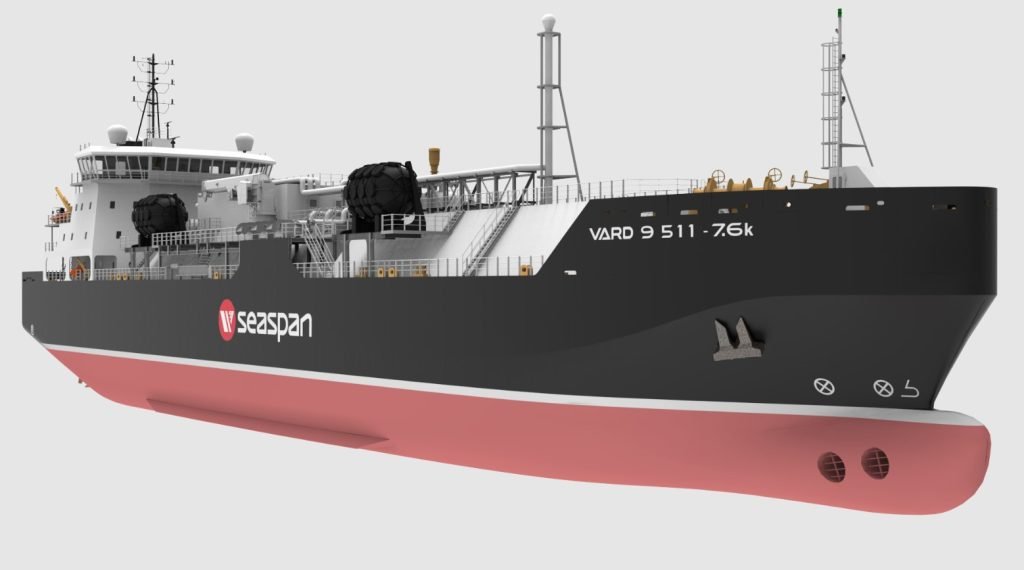 Scale Gas and Knutsen launch the first LNG bunker vessel built in Spain:
Scale Gas and Knutsen launch the first LNG bunker vessel built in Spain: The vessel, chartered by Shell Spain and built by Astilleros Armón Gijón, will operate in the Port of Barcelona and promote the use of LNG as a sustainable fuel in maritime transport. According to Enagás, it will serve more clients in the Mediterranean region, playing a key role in the security of supply in the region and promoting the use of LNG in marine transport. The barge has a storage capacity of 5000 m3, with two bilobal tanks of 2500 m3 each, and an LNG supply capacity of 1,000 m3/h.
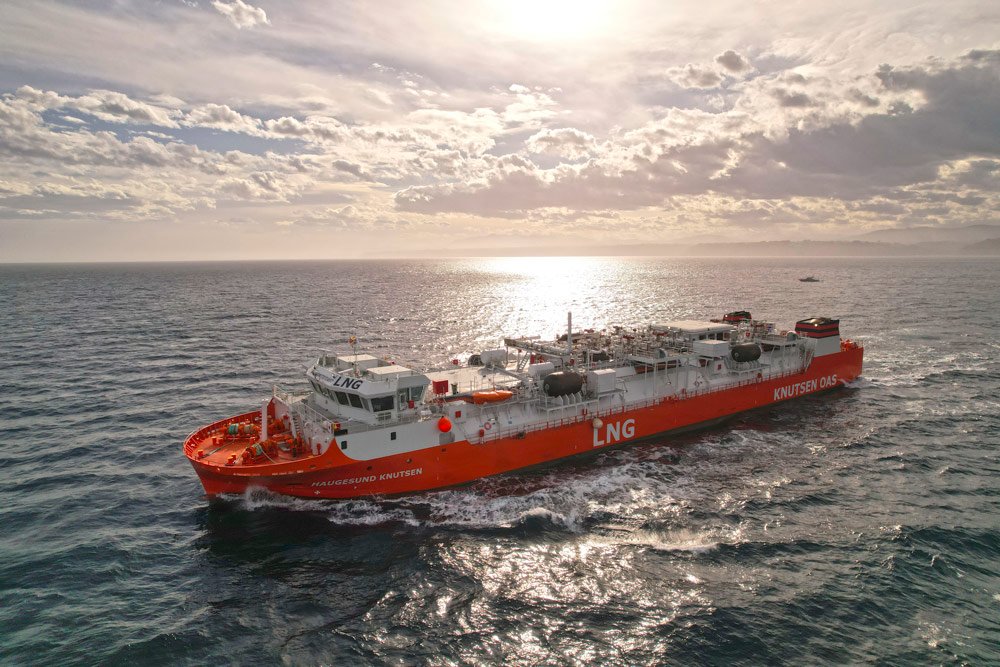
CAR CARRIER
NYK Line receives 1st LNG-powered car carrier from China Merchants: China Merchants Jinling Shipyard (Nanjing) Co. has delivered the first of four LNG-fuelled pure car truck carriers (PCTC) to Japanese shipping major NYK Line. The 7,000-CEU car carrier Jasmine Leader was ordered back in 2021, and it is expected to be assigned for transportation of vehicles between Europe and the Middle East. The ship, like its sister vessels, is equipped with battery hybrid technology, aimed at improving fuel efficiency by mitigating main engine and electrical generator load fluctuations through the support of batteries.

CRUISE
Fincantieri floats out eco-friendly cruise ship for Regent Seven Seas Cruises: Italian shipbuilder Fincantieri has launched a new eco-friendly cruise ship for Regent Seven Seas Cruises, a brand of Norwegian Cruise Line Holdings. Like the first two vessels of its class “Seven Seas Grandeur” is 55,500 gross tons with accommodation for only 746 passengers. The delivery is scheduled for November of this year. Weighing more than 142,500 tons and measuring almost 300 metres in length, Prima-class cruise ships can accommodate 3,215 guests. The Prima-class is based on a prototype project developed by Fincantieri with a focus on energy efficiency, a twofold aim of optimizing consumption at sea and reducing environmental impact.
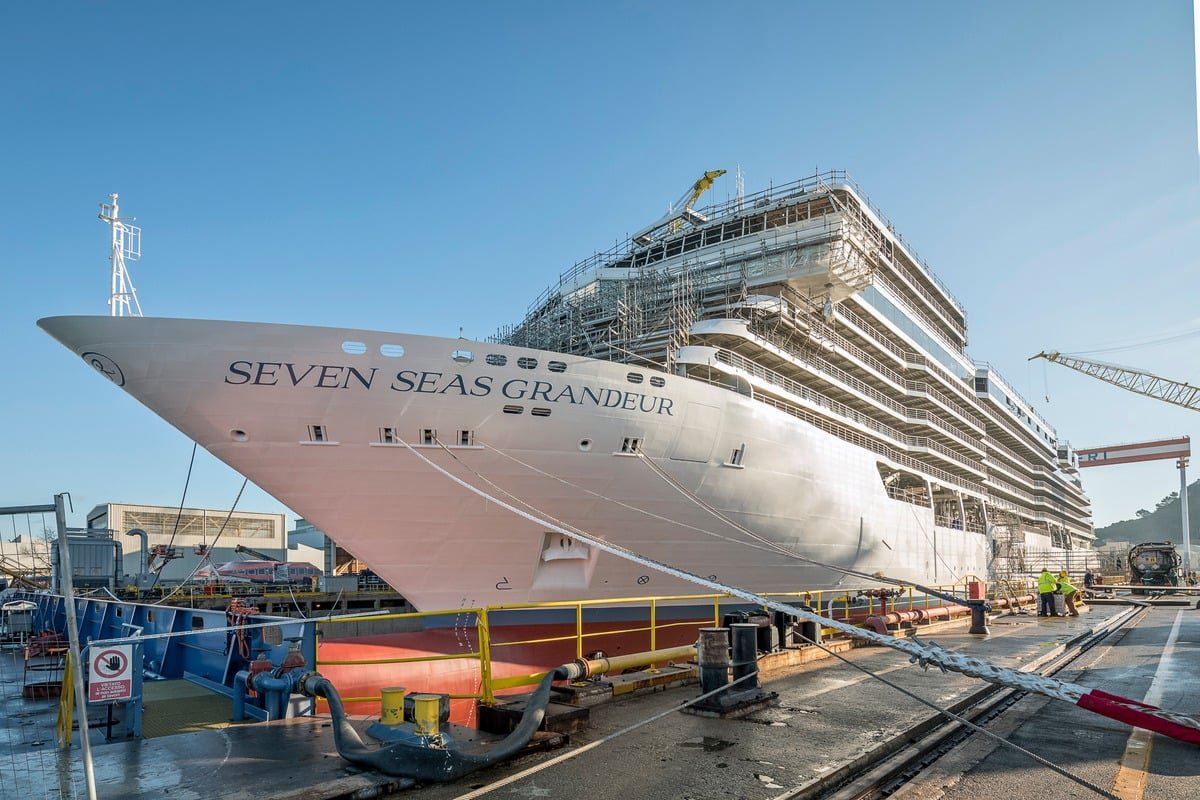
Technology
Liberian Registry awards AiP to Anemoi's rotor sails: The Liberian Registry has awarded an Approval in Principle (AIP) to Anemoi Marine Technologies for their Rotor Sail systems. Anemoi’s Rotor Sails are available with three deployment options - fixed to the deck, a folding type, and on rails that can be moved along or across the deck. The folding and rail systems were validated on a Newcastlemax bulk carrier design from SDARI and issued an AIP by Lloyd’s Register. The Liberian Registry conducted a technical review of the documentation including Energy Efficiency Design Index (EEDI) calculations and, as a result, issued an AIP with estimated energy efficiency improvements of about 20% in terms of EEDI performance. Anemoi Rotor Sails were created to accelerate the industry’s transition to zero-emission shipping by providing auxiliary propulsion to a vessel – this maintains vessel speed but allows the main engine to be powered down, resulting in fewer emissions.
Top Korean shipping lines back nuclear power: A host of Korean shipping lines including HMM, Sinokor, and H-Line Shipping along with the nation’s class society are pressing ahead with plans to develop nuclear-powered merchant ships. The shipping lines’ CEOs and the Korean Register, the Nuclear Research Institute, and the Korea Atomic Energy Research Institute met in Gyeongju City to discuss how to develop small-module nuclear reactors for ships. An agreement was signed to establish a cooperative basis for future commercialization through developing and demonstrating atomic technology for large ship propulsion with a focus on molten salt reactors (MSRs).
Classification
BV world's first AiP for Furai marine liquid hydrogen fuel tank: The first issuance of the BV Marine Liquid Hydrogen Fuel Tank AiP Certificate means that Furui and BV Group are at the forefront of the world in the trillion-dollar track of jointly entering the world marine hydrogen energy market, said BV. The certification is a phased achievement of Furui’s marine hydrogen business, which is also a milestone of R&D for this kind of ship and developing clean energy supporting production.
Fuels
Offshore wind partners unveil large-scale green hydrogen and e-fuel project in Baltic Sea: The Sweden-based company OX2 and the Bank of Åland, who are jointly developing two multi-gigawatt-scale offshore wind farms in Finland, have initiated a feasibility study on Mega Grön Hamn (Mega Green Port), a project involving large-scale production and distribution of hydrogen and e-fuel in Åland. The companies plan to establish the Mega Green Port at a site coexisting with the Port of Långnäs, deemed a suitable hub for their offshore wind projects Noatun North and South, which are planned to have a total generation capacity of 8 GW. According to the partners, Långnäs is an ideal location for construction activities on their offshore wind farms, and electrical connections, as well as for the production and distribution of hydrogen and electro fuel (e-fuel).
TotalEnergies Marine Fuels, Hapag-Lloyd, and Jurong Port Universal Terminal kick-start first biofuel bunker term delivery in Singapore: TotalEnergies Marine Fuels has successfully completed its first refueling of a Hapag-Lloyd container vessel in Singapore with sustainable, UCOME (Used Cooking Oil Methyl Ester)-based, marine biofuel. This inaugural bunker operation marks the start of a term supply agreement between the two companies, which commits TotalEnergies to provide VLSFO (Very Low Sulfur Fuel Oil) blended with 24% second-generation, waste-based, and ISCC-certified UCOME to Hapag-Lloyd’s fleet. Based on a well-to-wake assessment, this B24 biofuel blend will reduce approximately 20% of Greenhouse Gas (GHG) emissions compared with conventional fuel oil.
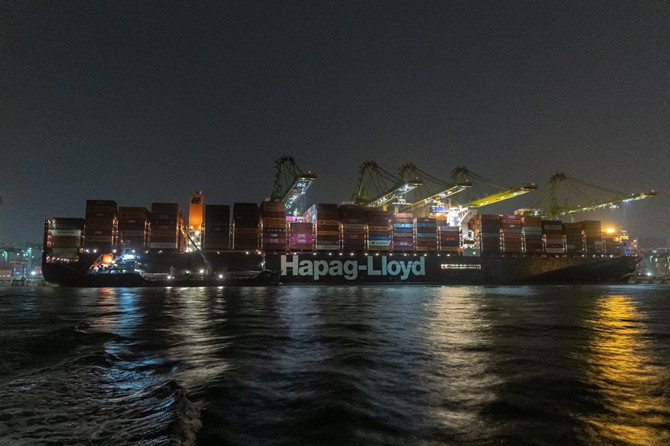
Marine Insurance
Skuld signs Poseidon Principles for marine insurance: Skuld announced its continued commitment to sustainable shipping by signing the Poseidon Principles for Marine Insurance. The Poseidon Principles for Marine Insurance are a global framework for assessing and disclosing the climate alignment of insurers’ hull and machinery portfolios. They enable the insurance sector to implement transparency and they establish a common, global baseline to quantitatively assess and disclose the alignment of the insurers’ shipping portfolios with climate goals. Skuld is a significant provider of hull and machinery insurance cover to the world fleet, and the Poseidon Principles for Marine Insurance provide a global framework to quantify and disclose the carbon intensity of an insurer’s marine hull portfolio.
Ports
Germany eyes hydrogen bunkering on Helgoland island: The municipality of Helgoland has commissioned HPC Hamburg Port Consulting (HPC) to carry out a concept study for the construction of a hydrogen bunker station on the deepsea island, which lies around 155 km northwest of Hamburg. The study will require HPC to investigate the commercial and infrastructural suitability of the island as a potential location for H2 fuel supply for shipping traffic on the North Sea. The concept study for a hydrogen bunker station on Helgoland is funded by the German Federal Ministry of Education and Research as part of the hydrogen lead project TransHyDe.
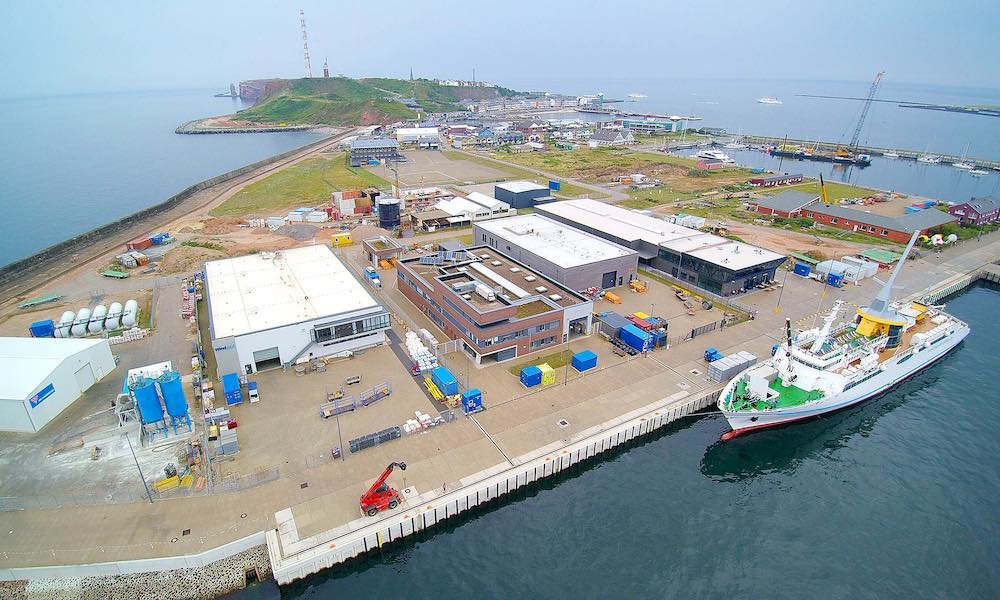
MPA Singapore discontinues LNG bunkering incentive: Maritime and Port Authority of Singapore (MPA) has decided to discontinue the 50% harbour craft port dues concession which was launched in 2021 for floating storage units (FSUs) / floating storage regasification units (FSRUs) supporting LNG bunkering and breakbulk activities in port. The discontinuation with immediate effect was announced in MPA’s circular on 6 February.
ICTSI’s Contecon-Manzanillo becomes Mexico’s first carbon-neutral port: ICTSI’s Contecon Manzanillo operator of the Specialised Container Terminal of the North Zone of the Port of Manzanillo (TEC-II) is the first in the Mexican port industry to be certified carbon neutral. The Carbon Neutrality UNE-14064-3:2019 certification recognizes Contecon Manzanillo’s commitment to global initiatives to combat climate change, promote renewable energy and decarbonize ports and maritime transport. The company said the carbon neutrality certificate highlights its efforts to offset greenhouse gas (GHG) emissions through reduction and compensation practices.
Governments
Zero emission vessel competition launched in the UK: The UK government has set aside £77m ($93m) to invest in green maritime technology. A government release stated that the funding will take the tech from the factory to the sea – identifying which projects will have a long-term impact in reducing emissions. Successful projects must show they could use this money to work with major UK ports and operators to launch a zero-emission vessel by 2025 at the latest. Examples of such technology include battery electric vessels, shoreside electrical power, ships running on low-carbon fuels like hydrogen or ammonia, and wind-assisted ferries.
Scottish sail project readies for testing: The Scottish government has detailed a new round of £1.35m($1.63m) funding for Dumfries-based Smart Green Shipping with the Di Gilpin-led company ready to install its first FastRig (pictured) for land-based testing in June. Smart Green Shipping is a systems design and engineering company developing unique retrofit sails and technology for sustainable commercial ships. Smart Green Shipping received a £1.8m grant from Scottish Enterprise last year towards a research and development project with a total value of £5m, match funded by the private sector.
By Maria Bertzeletou, Breakwave Advisors
The opinions expressed herein are the author's and not necessarily those of The Xinde Marine News.
Please Contact Us at:
media@xindemarine.com










 Ningbo Containerized Freight Index Weekly Commentar
Ningbo Containerized Freight Index Weekly Commentar  Ningbo Containerized Freight Index Weekly Commentar
Ningbo Containerized Freight Index Weekly Commentar  Ningbo Containerized Freight Index Weekly Commentar
Ningbo Containerized Freight Index Weekly Commentar  BIMCO Shipping Number of the Week: Bulker newbuildi
BIMCO Shipping Number of the Week: Bulker newbuildi  Ningbo Containerized Freight Index Weekly Commentar
Ningbo Containerized Freight Index Weekly Commentar  Ningbo Containerized Freight Index Weekly Commentar
Ningbo Containerized Freight Index Weekly Commentar